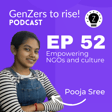Become a Creator today!Start creating today - Share your story with the world!
Start for free
00:00:00
00:00:01

The art of food with Logan Guleff
On this episode we talk with Logan Gullef, an author, entrepreneur, and chef! He won Masterchef in 2014 and was featured in TIME magazine as one of the 30 most influential teens. In addition to that, Logan won a Teen Choice award in 2019. The part 1 of our conversation is all about the art of food based on a Ted Talk in 2019. Stay tuned for the part 2 of our conversation with title "Behind the chef Logan Guleff".
Follow ChangemakerZ https://go.changemakerz.org/follow
Logan Guleff social media handles at https://lnkfi.re/logan-guleff
Access exclusive content on the ChangemakerZ app at https://app.changemakerz.org
Produced by Vasilis Skarleas
Transcript
Introduction to Changemaker-Z and Podcast Goals
00:00:01
Speaker
Hello everyone, I'm Kennedy. And I'm Vasiles. We run Changemaker-Z, a student-run initiative that aims to empower, educate, and connect Gen Zers interested in entrepreneurship. We interview teenagers with impactful projects and create resources to help you change the world. If they can't do it, so can he.
00:00:23
Speaker
On this podcast, we discuss the logistics of creating different types of projects with Jin Ziers who have already done it. We will leave our social media and website information in the description.
00:00:45
Speaker
Hello, everyone.
Guest Introduction: Logan Gulleff
00:00:46
Speaker
Welcome to another episode of Gen Zers to Rise. Today we have Logan Gulleff, an author, entrepreneur, and chef. He won MasterChef in 2014 and was featured in Time magazine as one of the 30 most influential teams. In addition to that, Logan won a Teen Choice Award in 2019. Logan, welcome to our show. We are so excited to have you here. Oh, thank you guys so much for having me today.
00:01:07
Speaker
Yes.
Logan's Culinary Journey Beginnings
00:01:08
Speaker
So our first question is, where did you learn to cook? Was it more of like a professional training or you just practicing on your own?
00:01:16
Speaker
Uh, it definitely was not much of a professional training. It was really just kind of me in the kitchen, having a lot of fun. You know, I started cooking when I was two with my mom and I did, you know, morning coffee, and then I kind of kept going into, you know, pasta, picks in a blanket, kind of these minor dishes. And then when I was eight, that was when everything really changed for me. That was when I wrote the first recipe. And then from there, it just really took off really quick. So.
00:01:42
Speaker
Definitely not professional, definitely just me in a kitchen, cutting up shit, you know, doing it. This is so amazing. Like, it was an inspiration. You wanted to try something and in the end, you turned it out to a career. We could say, do you enjoy a home cooked meal or eating out more?
00:02:06
Speaker
I definitely kind of prefer eating out, but I do enjoy eating, you know, mom's cooking, you know, there's something to that wholesomeness that's really delicious. But when it comes to, you know, training as a chef, eating out is probably one of the best kind of lessons you can get. You can see how people cook their dishes, how the chefs prepare their menus, how things are laid out, flavors and various things. So I certainly enjoy eating out quite a bit because I like to see, you know, one time I tried this burger with this, like,
00:02:36
Speaker
Brie whip mayonnaise and I was like oh that sounds delicious. Turns out the chef butchered it but there's an idea there and that's one of the things is you know you just kind of steal little things from little chefs and you think oh well you know I tried this dish and I like this element and I like that element so I can stitch them all together into this new thing. So when it comes to training you know definitely eating out you have to.
00:02:58
Speaker
That's kind of interesting. I would, I kind of thought you would say home cooked meal, like it would be an easy one, but no, that kind of makes sense though. You get to try other people's stuff and get their ideas. So I would, you said you enjoy like mom's home cooked meals. Like I would think the cooking would fall on you mostly.
Creating a Unique Culinary Path
00:03:16
Speaker
What is it? Yeah, well mom still cooks dinner because what I do, um, I mainly do creative cooking. So I do, you know, recipe development, kind of the interesting stuff, kind of the different stuff. And one of the things about that is that I don't really slog in the kitchen a lot. You know, I try not to, you know, I'm not cutting up a hundred thousand carrots.
00:03:35
Speaker
And because of that, I'm working more with flavor, working more with technique, working more with dishes and making things flow together. And, you know, it just means I don't really cook dinner for the family that often. Okay, that's really interesting. So, you know, you were able to turn this skill into a career. Do you have any tips for anyone who might be looking to get better at something and, you know, eventually monetize it?
00:03:59
Speaker
Of course, of course, I think that's one of the biggest things because whenever you're doing something that you love, you want to figure out, well, how do I do this and how do I make money at it so I can do this forever? That's one of the biggest things. I'd say one of the things is you got to create a breath of work. That's one of the biggest things. I have a book of recipes and I draw on those occasionally. You have to have a breath of work in order to really get there.
00:04:24
Speaker
If you're a music person and you're like composing things, you're making beats or singing songs, you have to kind of create a breath of work in order to kind of show off and monetize it. So like if you sing, maybe you sing a country song, maybe you sing a couple rock covers.
00:04:40
Speaker
Maybe you sing a little bit of this, a little bit of that. Or if you're making beats, have, you know, 20 or 30 beats in the backlog that you can say, well, you know, I did this one for this guy at this time, or I did this one because I really liked this sample and then I kind of stitched this together. So if I take parts of this, I can use it here. And that's definitely kind of a big deal whenever you're, you know, being a creative person.
00:05:03
Speaker
and doing work is you know drawing on yourself as inspiration as like well I did this video for YouTube and it went really well so how can I do something similar kind of the same kind of different kind of using that you know piggybacking off of yourself and off of your own momentum because you know once you get started creating it's a lot easier to keep creating than to restart creating
00:05:27
Speaker
This is awesome. You mentioned that when you're trying a new recipe, you're trying to earn new techniques or become better in your existing techniques. But for those who don't know, what is a technique? All right. So a technique for me is kind of a one contained skill and it is one very particular skill. So that would be like pan searing.
00:05:56
Speaker
that is a technique. And, you know, usually it's a method of cooking. So pan searing, dice, you know, rough chop, those kinds of techniques require a little bit different skills from you each time you do them. So like, you know, sous vide or fermenting, those are techniques or confit, roasting, grilling, those kinds of things are all different techniques. And also
00:06:23
Speaker
using your tools like using the food processor properly using you know the blender properly
00:06:29
Speaker
Those are also techniques that you might think are easy, but until you practice them and until you start working with them, you realize like, Oh man, I actually am not a very good blender. You know, I might put the stuff in, but then it jams and then it doesn't have a little liquid. And then it turns into this goop and like, Oh my God, I can't, I can't use the blender right. So there's a lot more that goes into things. Once you dig a little bit deeper under the surface, that's kind of a,
00:06:58
Speaker
a big thing about learning techniques and you know some of them you know help you with others you know definitely working on the stove helps you with grilling a little bit and you know working with knives helps you with working with more knives and like you know breaking down whole fish breaking down whole pieces of meat those are really big techniques that are very hard to master very hard to get into and very hard to practice
00:07:32
Speaker
All right, so this means that while you're following these cooking methods, then you can evolve in your cooking experience and in the end you can maybe become a master in the recipe that you like a lot.
Logan's Passion Projects and Interests
00:07:48
Speaker
I would like to ask what is Logan's underground super club? How do you get started with the idea?
00:07:55
Speaker
Yeah, for that one, that was really kind of a passion project for me of, you know, I wanted to get some of my food out there and I wanted to practice, you know, private dinners. And so, you know, that was kind of how I got the idea for the separate club and making it, you know, kind of this exclusive invite thing of, you know, I decided that I want to cook and I'm going to send out a couple of invites and you're either going to show up or you're not. And that's kind of one of the things about once you get to a certain point,
00:08:26
Speaker
of success, you can start doing limited time drops of things. You can start doing very specialized, fun, exciting little mini events. And if you're into fashion or you're into music, that's when you release a little snippet of a song and then a whole song, or you do a mix tape. Or if you're doing fashion, then you do a limited run of 200 shirts.
00:08:51
Speaker
That's all you make and then boom, you sell them out and you do the limited run. So for that, I kind of wanted to bring some of the spirit of that into cooking in a new way. And a lot of people say chefs are the new rock stars. And I think if you use those kind of techniques with food, it's very successful and it's very fun.
00:09:14
Speaker
And I think that that's one of the things that I try to embody as a chef is, you know, fun food, playful food, delicious food, interesting flavors, something new each time. And with that, you know, you have to you have to mold everything else around that. And so the supper club is kind of, you know, a little bit of that molding of, you know, what makes me so unique.
00:09:37
Speaker
Well, Logan, I wanted to ask you, you know, it's safe to say that your life has kind of always revolved around cooking. You know, you started, you said when you were two years old, at a very like high level, and then you won MasterChef. I kind of like leaned away from the MasterChef questions because you won what, in 2014, like eight years ago? Yeah, it was quite a while ago.
00:09:57
Speaker
It's quite a while. We get it. You probably are tired of answering about MasterChef, but is there anything outside of cooking or anything you want people to know about you? Do you have any other interests outside of cooking that you want to explore?
00:10:12
Speaker
Um, yeah, you know, I'm always fascinated with, uh, I always like music. I like rock climbing. I do some kayaking. Uh, I play pool and bowling. Uh, I think, you know, one of the things that a lot of people do is they try to simplify your character down into one thing.
00:10:29
Speaker
You know, I think that that's really being disingenuous to who you are. And if you can understand that, that that's not just who you are, then you can really evolve yourself past that and into, you know, well, you know, I do cook, but I also do this and that and the other, or yeah, I cook, but I also try to write novels or, you know, whatever it is that it is for you, um,
00:10:53
Speaker
kind of understanding that you don't have to have like one focus one focus helps and you know if you have one focus that you know pays the bills you know you're focused on your passion at you're good at um then you can kind of say oh well i like to do this on the side for fun or or i like to i like driving a lot so i like to drive roads and and i like cars and that kind of deal or you know i like playing video games but it's kind of understanding that all that
00:11:21
Speaker
You can be good at it, but you don't have to make it a career. For me, I made cooking my career, but I could also be a photographer. I could try to be a writer. I could try to be a musician, although I'd probably be pretty bad at it. I mean, I'm not the best, to be honest. I don't have the dedication, but I always think it's fascinating. I don't think I could be a painter.
00:11:43
Speaker
Well, it's good to you. Yeah, I just wanted to like ask you that because it's like I don't feel like anyone's, you know, giving you the opportunity to be like, for sure. All you do is cook, you know. Yeah, I mean, a lot of people think of just a kitchen robot that's, you know, just 24 seven. You know, I'm like, I've got the VR glasses on. I'm just watching, you know, episodes of Guy Fieri on rerun just endlessly. You know, you unplug me. I like, oh, yeah. Oh, duck all along. You know,
00:12:12
Speaker
So I think that's one of the things that you have to realize by yourself and about whoever you look up to is they probably have something on the side that they like to do and that they're probably pretty good at. You just have to have a couple of talents that you have and then turn one of those into something more. Not all of them. Don't turn all of them. No, don't do that. That's bad. Do not become professional in everything that you're good at.
00:12:41
Speaker
Is it too late for me to become an Olympic swimmer? I flop like a fish in water. I'm a terrible swimmer. I suck at it. I know it, and I don't even try. It's just like the spelling bee. I know I couldn't do it. I accepted it. That's another big thing is accepting what you can do, what you can't do, what you're good at, what you're not good at. I accept that I'm not a good swimmer. I accept that I can't spell the same in my life. I accept that.
00:13:07
Speaker
But I also understand that, you know, I'm a really good photographer, I'm a really good chef, I'm a pretty good video game player, and I'm a pretty good driver. And, you know, just kind of accepting what you're good at and understanding it and what you're passionate about, and then, you know, letting go of what you're not good at. You know, sometimes they say, well, oh, you know, just keep practicing, just be diligent, just keep hitting it, perseverance, perseverance, perseverance. You know, after some point, you've got to realize this ain't going to work. This ain't for me, you know?
00:13:37
Speaker
So I think that's a big thing that a lot of people don't understand is, you know, they might try to be a YouTuber or they might try to be a singer. They might, you know, just pour their soul into one, one thing. And then, you know, you just look at it and you're like, man, you're just not that good at it. But you should really be doing something else. You shouldn't be an actor. You should be, you know, a dancer or something else. And understanding, you know, your talents and always playing to your strengths is a big thing.
00:14:04
Speaker
Yeah, I think that's the key, what you just said. Plank to your strings. Yeah. Also, you mentioned that sefs are rock stars.
00:14:14
Speaker
I would say that chefs are also artists. In 2019, you did a tech talk about the art of food by taking us into your mind and showing us how you created this. I love how you use the painting to emphasize the cooking. It's truly an art for even if you're not a painter. And it is so clear that you are knowledgeable about food and it's amazing
00:14:43
Speaker
How was the experience? How did you come with your topic?
Innovations in Flavor and Cooking Philosophy
00:14:50
Speaker
Well, for the TED talk, um, the thing about it was I really wanted to figure out, you know, what was something that only I could share? And what was something that, you know, I, I knew that was unique, that was special to me. And I figured, you know, the art of flavor is really one of the things that sets apart my cooking, because I think about flavor and I think about it in such a unique way. I always try to, you know, layer it, blend it.
00:15:15
Speaker
and also a texture and technique too. And so it's a weaving of, you know, spicy, salty, sweet, savory.
00:15:23
Speaker
all of that into you know one kind of thing and then you add in the textures you add in the crunchy you add in the you add in you know all of that into it and that's kind of how you get a dish and so I found the best way to really explain that was through the painting and through each step and to how a dish changes from the beginning to the end and I would say the painting
00:15:45
Speaker
isn't very pretty. It's kind of weird looking. It looks weird. I'm going to be honest. It looks weird. But it's really how I think about it. Sometimes some elements create negative space. Some elements provide boldness. That's one of the things about seasoning. It's seasoning.
00:16:04
Speaker
really makes everything pop. So, you know, if you've got something that's bland, hit with some salt, hit with some pepper, try it again, then keep going. Because, you know, sometimes hitting it with all those little things, you know, just makes a black outline around whatever it is. And then you're like, Oh, wow, there it is. So I found like, you know, talking about food and color, talking about food and, and painting,
00:16:29
Speaker
And in the techniques and the paying too, um, it's just kind of the easiest way to explain how I go about it and how I go about, you know, the conceptual start of what do I want to achieve? How do I want to get there? What is each element at? And you know, that's one of the biggest things is, you know, a lot of people think like, Oh, I can just add whatever, you know, really one of the best things about cooking is to understand, you know, when to add.
00:16:55
Speaker
ones to subtract and how to keep it balanced. You know, you can add all these spices into a spice blend, but that doesn't make it a good spice blend. You know, one of the things that makes it a good spice blend is the balance between salty, sweet, spicy, smoky. The, just the whole thing is what makes it a good spice blend. And understanding that and realizing, you know, Oh, I don't need five different types of chili powder in this, I need
00:17:24
Speaker
these three, or I need one type of chili powder, one thing of smoked paprika, and then I'm going to add in, you know, black pepper or whatever it is, you know, whatever, whatever, however it goes, you know, sometimes people don't realize with food that less is more and to let each individual ingredient sing on its own, you know, it's one of the biggest things about ingredient quality is, you know, if you have poor ingredient quality, you try to cover it up. That's why, you know, tacos are spicy.
00:17:54
Speaker
That's why they're so seasoned, because they're just using ground beef. And ground beef isn't really exciting. I'm just going to be honest. Ground beef and tacos and chili, not very exciting. And whatever tough cuts you have aren't very exciting pieces of meat. And sometimes they can have a gamey flavor, sometimes they can taste bad. They're like, oh, man. So that's why they add all these flavors into it, is to cover up and mask the flavor and the ingredients.
00:18:23
Speaker
But if you buy, you know, like best ground beef in the world, you know, you don't want to cover it up because it's going to taste amazing. So yeah, like a Wagyu ground beef or like, you know, just like a ground steak, a good butcher, butcher shop ground beef. You know, that's going to taste really good. It's going to taste really beefy. It's going to have a great texture. And you know, it's not going to be the grocery store ground beef. And so understanding, you know, when to cover up, when to kind of enhance and let it shine and
00:18:53
Speaker
Kind of understanding that balance with ingredients is very big. And it's something that a lot of home cooks really struggle to make that step with. Because they'll hear, like, Gordon Ramsay say, like, oh, less is more. They're like, what the fuck? What? What? What's that supposed to mean? Less is more? How am I supposed to do that? You know, I want to put more sides. I want to put carrots. I want to put asparagus. And I want to put artichoke.
00:19:14
Speaker
I don't realize that, you know, if you just understand the flavors and you understand that I want to do an artichoke sea bass and that's it, that that's really a lot better than to say, oh, yeah, well, I want to do an artichoke, asparagus, carrot medley with this mango salsa. And then I want to do this, you know, roasted sea bass with, you know, prawns on top. It's crazy.
00:19:41
Speaker
You're covering up the flavor of the sea bass. You're messing everything up. Nothing's balanced. Nothing's in the same place. It's just a mess of a dish. And understanding, you know, dish composition is really, really important.
00:19:56
Speaker
I, yeah, I love hearing you talk about all these things because as a normal person ever, a little home-cooked chef, I don't think about how much goes into it. Like you said, it's really a science and it's like, I love, and when you are like describing the flavors and stuff, all I can think about is that ratatouille scene where it's just the knee and then it's like burst, and a burst of this. That's one of the best things to do.
00:20:20
Speaker
you know, is when you can get the flavors going off at the right times, you know, getting the flavors to travel through the dish, you know, is really, really important, really big, high level, very hard to do concept of, you know, getting it all not to just hit the front of your tongue, but to hit the different areas of your tongue as you eat it. And you know, one of the things about being so deep into food is, you know, you notice all this. So
00:20:44
Speaker
Like I noticed every single imperfection whenever I go out to eat, I'm like, well, you know, this was overdone by a minute, that was underdone. This, you bought the wrong carrots. You didn't buy organic carrots, I can taste it. You can taste the organic? Oh yeah, yeah. Organic has a much different flavor. On a couple things, carrots and bananas are the two biggest. You buy organic bananas, they taste a lot better. You buy organic carrots, they taste a lot better. Organic broccoli.
00:21:11
Speaker
Eh, you can probably pass. But some things I can tell, and you know, I can tell the difference between Atlantic salmon and Pacific salmon, farm-raised, wild-caught, just by tasting it, just by eating it. And one time, this is actually a pretty funny story. So I had this chef friend, and chefs give tests. It's something they do to try to figure out, you know, are you the real deal? Are you good? Are you really all this? Or are you just, you know, faking it? Yeah, are you faking it or are you real? And so,
00:21:41
Speaker
he we were we each ordered espresso so he had his decaf and i had mine caffeinated as yeah and so they come out and uh the way the waiter says that he's he's messed it up he's confused him and the chef tells me logan tell tell me which one is which tell me which espresso is my espresso and which espresso is your espresso
00:22:08
Speaker
Anyway, there's these two almost exactly the same cups of espresso. One's caffeinated, one's decaf. And it's those kind of things that you have to be that into food to figure out and to be able to pass these tests. Of course, I got it because, you know, the caffeinated had bubbles and the decaf didn't, I think, was how I got it. So I did, I did get it right. But it's just one of those things that you have to be like, super, super,
00:22:36
Speaker
just laser focus into food in order to pick up all the intricacies and nuances that, you know, high level food requires. And I'm sure it's the same with, you know, once you make it to the same point with, you know, anything else.
Closing Remarks and Social Media Shoutout
00:22:52
Speaker
Well, guys, I think that is the end of today's episode. It was such an honor to feature Logan on our show today. Thank you so much for coming and sharing your passion with us. And guys, Logan Guleff is an inspiring young chef for all the ages awarded with multiple awards. We're going to include Logan's social media handles in the description below.
00:23:14
Speaker
And do not forget to install the Changemaker-Z app and access exclusive experience and Gen Z articles directly from your favorite smart device. A new update with new features is coming out soon both on iOS and Android. Till next time, do not forget to change the world. Bye!
00:23:42
Speaker
Thank you guys for listening. We hope you enjoyed the conversation. We had such a great time. Make sure to leave us a review. If you want more Changemaker's content, you can follow us on Instagram at JinsearsToRise and on Facebook at ChangemakerZ.



















